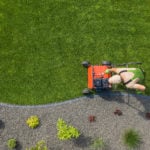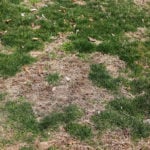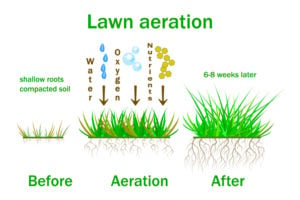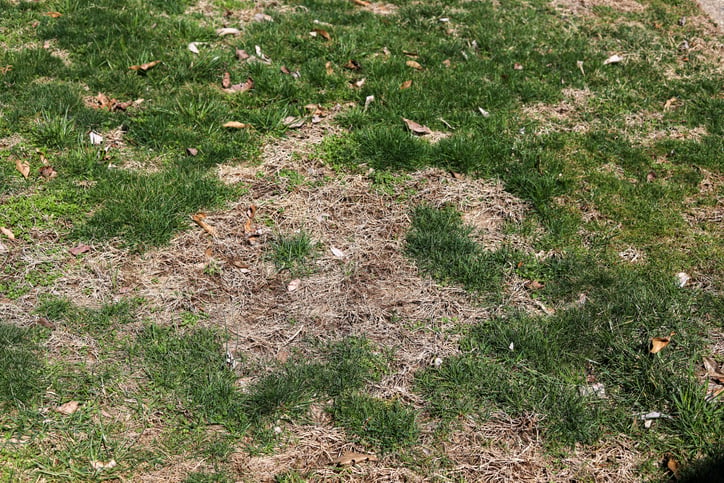Soil compaction is a primary cause of an unhealthy lawn. If your soil is too tight to penetrate, the water and nutrients it needs can’t get deep enough. But there are a few things you can do to keep your soil loose and your grass thriving.
So, let’s take a look at what causes soil compaction and how you can alleviate it to keep your lawn healthy and beautiful.
What Causes Soil Compaction?
 According to Michigan State University, soil compaction occurs when soil particles are packed closely together, and it tends to be more common with heavier soils like clay and loam. However, if you’re using heavy equipment on your lawn or in the garden, it can cause a problem. Even wheel tracks from a riding lawn mower are enough to compact your soil.
According to Michigan State University, soil compaction occurs when soil particles are packed closely together, and it tends to be more common with heavier soils like clay and loam. However, if you’re using heavy equipment on your lawn or in the garden, it can cause a problem. Even wheel tracks from a riding lawn mower are enough to compact your soil.
The problem may also be long-term—events that are happening to your soil year over year. The pore spaces can be reduced to the point that air and water cannot move freely and plant roots cannot grow easily into the surrounding soil. The soil could remain overly wet longer than is healthy for the plants growing there.
Other Contributing Factors
There are a few additional factors that contribute to soil compaction. They include:
Soil Tillage: Tilling your soil is actually supposed to help break it up. But if you do it too much, it actually increases soil compaction. How? By breaking the soil structure down into aggregates that are too small, which leads to fewer pore spaces. It’s soil science.
Tilling Wet Soil: Avoid tilling in wet soil as soil compaction can occur and lead to poor root penetration in the growing season. If it rains, it’s best to wait a few days to allow the soil to become semi-dry. Always check your soil moisture before tilling.
Adding Sand: Adding sand to clay creates a compact mass that’s like concrete.
How To Pinpoint Compacted Soil
 Soil compaction keeps plants (or grass) from getting proper access to nutrients, water, and air. This will eventually cause your grass to lose color, wither and die. If you’re seeing brown spots in your lawn, or if water is ponding in your yard after rainfall, your soil may be compacted.
Soil compaction keeps plants (or grass) from getting proper access to nutrients, water, and air. This will eventually cause your grass to lose color, wither and die. If you’re seeing brown spots in your lawn, or if water is ponding in your yard after rainfall, your soil may be compacted.
Another sign of soil compaction is thatch. A thick layer of thatch can starve your grass — even in the best conditions. If the nutrients can’t reach the plant, it will turn brown. Thatch buildup happens if there is poor soil aeration and drainage.
A way to find out if your soil is compacted is by determining its bulk density. Bulk density is an indicator of soil compaction. You can calculate it by dividing the dry weight of your soil by its volume. This volume includes the volume of soil particles and the volume of pores among soil particles.
If you find out that the density of the soil is not where it should be, you’ll have to take steps to loosen it.
Lawn Aeration For Soil Compaction
One of the best ways to alleviate soil compaction is to aerate your lawn. A core aerator comes equipped with tines that will pull out plugs of soil and leave holes in your lawn. This will loosen the soil, and in turn, compaction decreases.
 Looser soil will help get air to the roots of your grass and promote root growth. Deep tine equipment is more effective at reducing soil compaction at depths below 2.5 inches. And with some equipment, there is the additional benefit of a small amount of thatch control, as the slicing or core removal also removes some thatch.
Looser soil will help get air to the roots of your grass and promote root growth. Deep tine equipment is more effective at reducing soil compaction at depths below 2.5 inches. And with some equipment, there is the additional benefit of a small amount of thatch control, as the slicing or core removal also removes some thatch.
Warm-season grasses can be aerified starting in late spring through late summer. Cool-season grasses are best aerified in early fall or early spring.
At Lush Lawn, our core aeration service helps lawns stay lush and healthy year-round. We’ll use our state-of-the-art equipment to ensure optimal results. We give lawns the room they need to absorb nutrients — all while eliminating areas of standing water that can lead to lawn diseases. We recommend at least one core aeration service in the spring or fall, and even better if you’re able to aerate twice per season.
See how aerating can help relieve soil compaction in your yard, contact us today.
